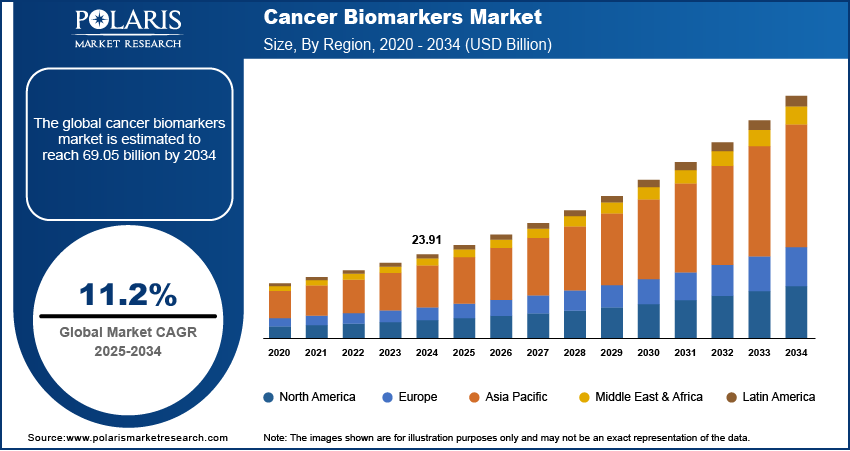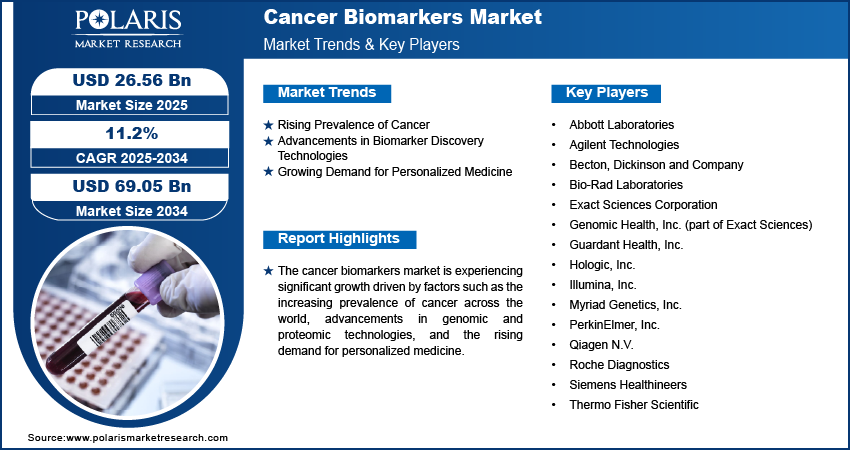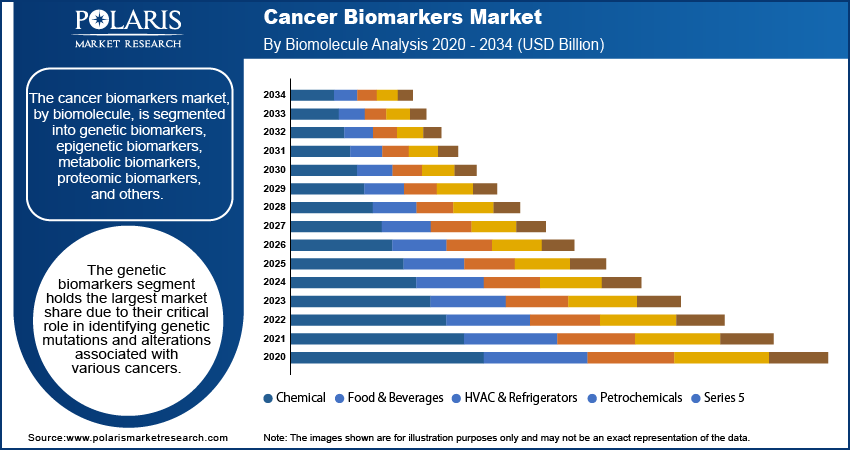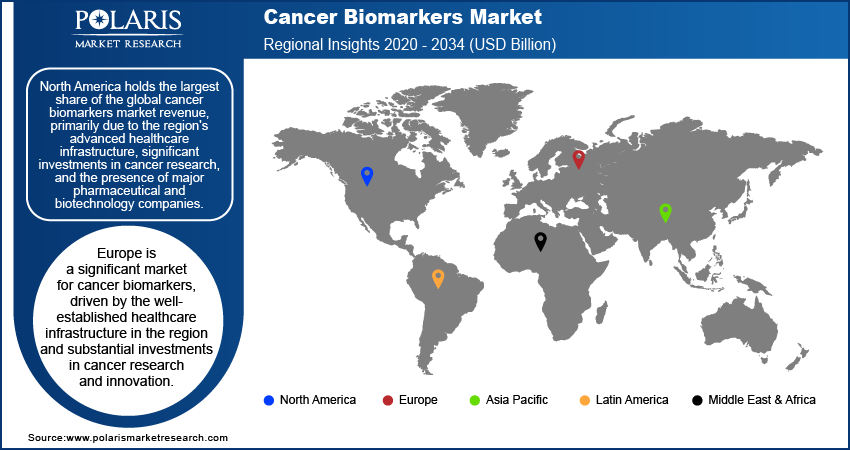
Cancer Biomarkers Market Size, Share, Trends, Industry Analysis Report
: By Type (Breast Cancer, Prostate Cancer, Colorectal Cancer, Cervical Cancer, Liver Cancer, Lung Cancer, and Others), Biomolecule, Application, and Region (North America, Europe, Asia Pacific, Latin America, and Middle East & Africa) – Market Forecast, 2025–2034
- Published Date:Aug-2025
- Pages: 119
- Format: PDF
- Report ID: PM3738
- Base Year: 2024
- Historical Data: 2020-2023
Market Overview
The cancer biomarkers market size was valued at USD 23.91 billion in 2024, exhibiting a CAGR of 11.2% during 2025–2034. The market is driven by the rising global cancer burden, advancements in biomarker discovery technologies, increasing investments in cancer research, growing demand for personalized medicine and companion diagnostics, and the integration of AI and liquid biopsy innovations for early detection and monitoring.
Key Insights
- The genetic biomarkers segment leads due to its key role in detecting cancer mutations and its use in personalized medicine, aided by advances in genomic technology.
- Proteomic biomarkers are growing fastest as protein profiling helps understand cancer progression and develop targeted therapies, boosted by mass spectrometry and bioinformatics innovations.
- The diagnostics segment dominates, driven by demand for accurate early cancer detection using biomarkers that improve screening and patient outcomes.
- North America leads with a strong healthcare infrastructure, high cancer prevalence, major research investments, advanced diagnostics, and supportive regulations.
- Europe’s market grows steadily, driven by strong healthcare systems, precision oncology focus, and collaborations in countries such as Germany, the UK, and France.
- Asia Pacific shows the highest growth due to rising cancer cases, better healthcare, government support, and expanding biotech and clinical research in key countries.
Industry Dynamics
- Rising cancer prevalence increases demand for early detection biomarkers and personalized treatment tools globally.
- Advancements in genomics and proteomics accelerate the discovery of precise and novel cancer biomarkers.
- Growth in companion diagnostics supports tailored cancer therapies and enhances biomarker utilization.
- Integration of AI in biomarker discovery improves analysis speed and accuracy, boosting innovation.
- High costs of advanced sequencing technologies limit access and slow adoption in emerging markets.
Market Statistics
2024 Market Size: USD 23.91 billion
2034 Projected Market Size: USD 69.05 billion
CAGR (2025–2034): 11.2%
North America: Largest market in 2024
AI Impact on Cancer Biomarkers Market
- AI enhances the speed and accuracy of biomarker discovery by analyzing large datasets more efficiently than traditional methods.
- Machine learning algorithms help identify novel cancer biomarkers by recognizing complex patterns in genomic and proteomic data.
- AI-driven tools improve personalized treatment plans by integrating biomarker information with patient-specific clinical data.
- The use of AI in liquid biopsy analysis supports noninvasive, real-time monitoring of cancer progression and treatment response.

To Understand More About this Research: Request a Free Sample Report
The cancer biomarkers market focuses on the identification and utilization of biological molecules, such as proteins, DNA, RNA, and other biomolecules, to detect and monitor cancer. These biomarkers are used for diagnostic, prognostic, and therapeutic purposes. Key drivers of this market include the rising prevalence of cancer, advancements in biomarker discovery technologies, and increased government and private sector investments in cancer research. Additionally, the growing demand for personalized medicine and companion diagnostics is significantly influencing the cancer biomarkers market development. Trends in the market include the integration of artificial intelligence (AI) in biomarker discovery and the development of noninvasive liquid biopsy tests, which are anticipated to enhance early detection and monitoring of cancer.
Market Dynamics
Rising Prevalence of Cancer
The increasing global burden of cancer is a significant driver of the cancer biomarkers market demand. According to the World Health Organization (WHO), cancer is one of the leading causes of death worldwide, with an estimated 19.3 million new cases and 10 million deaths in 2020. The growing incidence of cancer necessitates improved diagnostic and therapeutic tools, leading to a higher demand for biomarkers that can aid in early detection, prognosis, and personalized treatment strategies.
Advancements in Biomarker Discovery Technologies
Technological advancements in genomics, proteomics, and metabolomics are propelling the development of new cancer biomarkers. Next-generation sequencing (NGS) and high-throughput screening technologies have revolutionized the process of biomarker discovery, enabling the identification of novel biomarkers with greater precision and speed. For instance, the integration of NGS in cancer diagnostics allows for comprehensive genomic profiling, which helps in identifying actionable mutations and tailoring targeted therapies. Therefore, the rapid adoption of these advanced technologies in biomarker discovery drives the cancer biomarkers market growth.
Growing Demand for Personalized Medicine
Personalized medicine involves tailoring medical treatment to the individual characteristics of each patient, which relies heavily on the identification and utilization of specific biomarkers. According to a report by the Personalized Medicine Coalition, personalized treatments accounted for 42% of all new molecular entities approved by the US Food and Drug Administration (FDA) in 2021. This trend underscores the critical role of cancer biomarkers in developing targeted therapies and improving patient outcomes. Thus, the rising shift toward personalized medicine biomarkers is significantly contributing to the cancer biomarkers market expansion.

Segment Insights
Assessment – Type-Based Insights
The cancer biomarkers market segmentation, by biomolecule, includes genetic biomarkers, epigenetic biomarkers, metabolic biomarkers, proteomic biomarkers, and others. The genetic biomarkers segment holds the largest market share due to their critical role in identifying genetic mutations and alterations associated with various cancers. The widespread adoption of genetic testing in personalized medicine and the development of targeted therapies based on genetic profiling contribute significantly to this segment’s dominance. The advancements in next-generation sequencing (NGS) and genomic technologies have further facilitated the identification and clinical application of genetic biomarkers in cancer diagnosis and treatment.
The lung cancer segment is registering the highest growth rate, attributed to the rising incidence of lung cancer, particularly due to increased smoking rates and environmental pollution. The development of noninvasive diagnostic methods, such as liquid biopsy and circulating tumor DNA (ctDNA) analysis, is enhancing the early detection and management of lung cancer, contributing to the segment's rapid growth. Additionally, the introduction of innovative biomarkers and targeted therapies is supporting the expansion of the lung cancer segment.
Outlook – Biomolecule-Based Insights
The cancer biomarkers market segmentation, by biomolecule, includes genetic biomarkers, epigenetic biomarkers, metabolic biomarkers, proteomic biomarkers, and others. The genetic biomarkers segment holds the largest market share due to their critical role in identifying genetic mutations and alterations associated with various cancers. The widespread adoption of genetic testing in personalized medicine and the development of targeted therapies based on genetic profiling contribute significantly to this segment’s dominance. The advancements in next-generation sequencing (NGS) and genomic technologies have further facilitated the identification and clinical application of genetic biomarkers in cancer diagnosis and treatment.
The proteomic biomarkers segment is experiencing the highest growth, driven by the increasing focus on protein expression profiling and the identification of protein-based biomarkers for cancer detection and therapy. Proteomic biomarkers are crucial in understanding the molecular mechanisms of cancer progression and in developing protein-targeted therapies. The integration of mass spectrometry and bioinformatics tools in proteomics research has enhanced the discovery and validation of novel proteomic biomarkers, thereby accelerating the growth of this segment.
Evaluation – Application-Based Insights
The cancer biomarkers market, by application, is segmented into drug discovery and development, diagnostics, personalized medicine, and others. The diagnostics segment holds the largest market share, driven by the increasing demand for early and accurate cancer detection methods. The use of biomarkers in diagnostics enhances the precision of cancer screening and monitoring, leading to improved patient outcomes. The growing prevalence of cancer and advancements in diagnostic technologies, such as liquid biopsy and molecular imaging, are key factors contributing to the prominence of this segment.
The personalized medicine segment is registering the highest growth, fueled by the rising trend toward individualized treatment approaches. Biomarkers play a pivotal role in personalized medicine by enabling the identification of specific genetic and molecular profiles that guide targeted therapy decisions. The increasing focus on precision medicine, coupled with advancements in biomarker discovery, is accelerating the adoption of personalized treatment strategies, thereby driving the segment growth.

Regional Insights
By region, the study provides cancer biomarkers market insights into North America, Europe, Asia Pacific, Latin America, and the Middle East & Africa. North America holds the largest market share, primarily due to the region's advanced healthcare infrastructure, significant investments in cancer research, and the presence of major pharmaceutical and biotechnology companies. The high prevalence of cancer, coupled with strong government support for research and development, drives the adoption of cancer biomarkers in diagnostics and personalized medicine. Additionally, favorable regulatory frameworks and widespread implementation of advanced diagnostic technologies contribute to North America’s dominance in the market. Market in other regions, including Europe and Asia Pacific, is also experiencing growth, driven by increasing healthcare expenditures and rising awareness of early cancer detection.
Europe is a significant market for cancer biomarkers, driven by the region's well-established healthcare infrastructure and substantial investments in cancer research and innovation. Countries such as Germany, the UK, and France are leading contributors, with a focus on early detection and personalized medicine. The European Union’s emphasis on precision oncology and the integration of advanced diagnostic technologies propel the adoption of cancer biomarkers across Europe. Collaborative initiatives between academic institutions and biotech companies are also enhancing research and development efforts in this region.
The Asia Pacific cancer biomarkers market is experiencing rapid growth, attributed to the increasing prevalence of cancer, improving healthcare infrastructure, and growing awareness of early cancer detection. Countries such as China, Japan, and India are at the forefront, with significant government investments in healthcare and biotechnology. The rising demand for personalized medicine and the adoption of advanced diagnostic technologies, such as next-generation sequencing, are driving the Asia Pacific cancer biomarkers market expansion. Additionally, the expanding pharmaceutical industry and growing clinical research activities in Asia Pacific are contributing to the regional market growth.

Key Players and Competitive Insights
The cancer biomarkers market features several key players actively contributing to its growth and innovation. Notable companies are Roche Diagnostics (a global player in diagnostics and personalized healthcare) and Thermo Fisher Scientific, which is known for its comprehensive range of diagnostic tools and reagents. Abbott Laboratories continues to be a significant player with its robust portfolio in molecular diagnostics. Other active participants include Qiagen N.V., specializing in sample and assay technologies, and Illumina, Inc., recognized for its advancements in sequencing and genomic solutions. Bio-Rad Laboratories and Agilent Technologies are also pivotal, offering a variety of instruments and assays for biomarker research. Additional companies such as PerkinElmer, Inc. and Hologic, Inc. are making strides in cancer diagnostics and biomarker discovery.
Myriad Genetics, Inc. focuses on genetic testing and precision medicine, and Exact Sciences Corporation is known for its innovative cancer screening products. Siemens Healthineers, a major provider of diagnostic imaging and laboratory diagnostics, and Genomic Health, Inc., part of Exact Sciences, are influential in the personalized cancer care space. Other important contributors are Becton, Dickinson and Company, which provides a wide array of medical devices and diagnostic solutions, and Biocartis, which focuses on molecular diagnostics. Moreover, companies such as Foundation Medicine, Inc., a subsidiary of Roche, and Guardant Health, Inc., specializing in liquid biopsy technologies, are key players driving advancements in the market.
The competitive landscape of the cancer biomarkers market is characterized by continuous innovation and strategic collaborations. Companies are heavily investing in research and development to expand their biomarker portfolios and enhance diagnostic accuracy. The integration of artificial intelligence and big data analytics is becoming increasingly prevalent, enabling more precise and personalized cancer care. Partnerships and acquisitions are also common as companies aim to strengthen their market presence and technological capabilities. This dynamic competition boosts rapid advancements in biomarker discovery and application, ultimately improving patient outcomes and shaping the future of cancer diagnostics and treatment.
Roche Diagnostics is a significant player in the cancer biomarkers market, known for its extensive portfolio in diagnostics and personalized healthcare solutions. The company focuses on developing innovative diagnostic tools to support early cancer detection and treatment decisions.
Thermo Fisher Scientific is another major participant, offering a wide range of diagnostic tools and services, including next-generation sequencing and molecular assays. The company is actively involved in enhancing cancer diagnostics and research through its advanced technologies.
List of Key Companies
- Abbott Laboratories
- Agilent Technologies
- Becton, Dickinson and Company
- Bio-Rad Laboratories
- Exact Sciences Corporation
- Genomic Health, Inc. (part of Exact Sciences)
- Guardant Health, Inc.
- Hologic, Inc.
- Illumina, Inc.
- Myriad Genetics, Inc.
- PerkinElmer, Inc.
- Qiagen N.V.
- Roche Diagnostics
- Siemens Healthineers
- Thermo Fisher Scientific
Cancer Biomarkers Industry Developments
- In November 2024, Roche announced the launch of a new genomic profiling test designed to identify genetic mutations in cancer patients. It aims to advance personalized treatment strategies.
- In November 2024, Thermo Fisher expanded its collaboration with Mainz Biomed, a oncology research company, to potentially develop and commercialize colorectal cancer screening products.
Market Segmentation
By Type Outlook
- Breast Cancer
- Prostate Cancer
- Colorectal Cancer
- Cervical Cancer
- Liver Cancer
- Lung Cancer
- Others
By Biomolecule Outlook
- Genetic Biomarkers
- Epigenetic Biomarkers
- Metabolic Biomarkers
- Proteomic Biomarkers
- Others
By Application Outlook
- Drug Discovery & Development
- Diagnostics
- Personalized Medicine
- Others
By Regional Outlook
- North America
- US
- Canada
- Europe
- Germany
- France
- UK
- Italy
- Spain
- Netherlands
- Russia
- Rest of Europe
- Asia Pacific
- China
- Japan
- India
- Malaysia
- South Korea
- Indonesia
- Australia
- Vietnam
- Rest of Asia Pacific
- Middle East & Africa
- Saudi Arabia
- UAE
- Israel
- South Africa
- Rest of Middle East & Africa
- Latin America
- Mexico
- Brazil
- Argentina
- Rest of Latin America
Report Scope
|
Report Attributes |
Details |
|
Market Size Value in 2024 |
USD 23.91 billion |
|
Market Size Value in 2025 |
USD 26.56 billion |
|
Revenue Forecast by 2034 |
USD 69.05 billion |
|
CAGR |
11.2% from 2025 to 2034 |
|
Base Year |
2024 |
|
Historical Data |
2020–2023 |
|
Forecast Period |
2025–2034 |
|
Quantitative Units |
Revenue in USD billion and CAGR from 2025 to 2034 |
|
Report Coverage |
Revenue Forecast, Market Competitive Landscape, Growth Factors, and Trends |
|
Segments Covered |
|
|
Regional Scope |
|
|
Competitive Landscape |
|
|
Report Format |
|
|
Customization |
Report customization as per your requirements with respect to countries, regions, and segmentation. |
How is the report valuable for an organization?
Workflow/Innovation Strategy
The cancer biomarkers market has been segmented into detailed segments of type, biomolecule, and application. Moreover, the study provides the reader with a detailed understanding of the different segments at both the global and regional levels.
Growth/Marketing Strategy
The cancer biomarkers market growth and marketing strategy focuses on continuous innovation, strategic partnerships, and expanding product portfolios. Companies are investing heavily in research and development to introduce advanced diagnostic tools and personalized treatment options. Additionally, collaborations with academic institutions and biotechnology firms are enhancing the discovery and validation of new biomarkers. Increased awareness around early cancer detection and personalized medicine is driving demand for cancer biomarkers. Companies are also exploring digital solutions, including AI-based technologies, to improve diagnostic accuracy and speed, positioning themselves to meet the growing need for precise cancer care.
FAQ's
The cancer biomarkers market size was valued at USD 23.91 billion in 2024 and is projected to grow to USD 69.05 billion by 2034.
The market is projected to register a CAGR of 11.2% during the forecast period.
North America held the largest share of the market in 2024.
The cancer biomarkers market features several key players actively contributing to its growth and innovation. Notable companies include Roche Diagnostics, a global player in diagnostics and personalized healthcare, and Thermo Fisher Scientific, known for its comprehensive range of diagnostic tools and reagents.
The breast cancer segment accounted for the largest share of the market in 2024.
The genetic biomarkers segment accounted for the largest share of the market in 2024.
Cancer biomarkers are biological molecules found in blood, tissues, or other bodily fluids that can indicate the presence of cancer or provide information about the type and progression of the disease. These biomarkers can be proteins, genetic mutations, RNA, or other molecular substances that reflect changes in the body caused by cancer. Cancer biomarkers are used in various applications, such as early disease detection, diagnosis, prognosis, and monitoring the effectiveness of treatments. They play a crucial role in personalized medicine by helping doctors tailor treatment plans based on the specific characteristics of a patient's cancer.
A few key trends in the market are described below: Increased Use of Liquid Biopsies – Growing adoption of noninvasive testing methods such as liquid biopsy for early cancer detection and monitoring. Integration of Artificial Intelligence (AI) – AI and machine learning are being used to analyze large datasets, improving the discovery and validation of biomarkers. Adoption of Personalized Medicine – Rising demand for tailored cancer treatments based on genetic profiling and biomarker analysis. Advancements in Next-Generation Sequencing (NGS) – NGS technologies are accelerating the discovery of new cancer biomarkers and enabling more precise diagnosis
A new company entering the cancer biomarkers market must focus on developing innovative diagnostic solutions, particularly in areas such as liquid biopsy and noninvasive testing, as these are gaining traction for early cancer detection. Emphasizing personalized medicine by offering advanced genomic and proteomic profiling tools could provide a competitive edge. Leveraging AI and machine learning to enhance biomarker discovery and improve diagnostic accuracy can also differentiate the company. Collaborating with healthcare institutions and biotech firms to validate biomarkers and streamline regulatory approval processes will be key to staying ahead. Additionally, focusing on emerging cancer types or under-researched biomarkers may present untapped market opportunities.
Companies manufacturing, distributing, or purchasing cancer biomarkers-related products and other consulting firms must buy the report.
